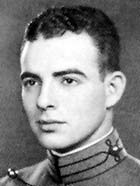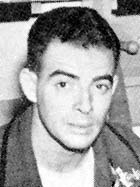Courtesy of His Classmates
United States Military Academy Class of 1943
Thomas Henderson Farnsworth
No. 13410 • Died 22 December 1985
Died in Waterford, Maine, aged 65 years
Interment: Arlington National Cemetery, Arlington, Virginia
Now he is gone, that gallant soldier loaned to our class from an earlier century. Tom Farnsworth died just before Christmas after a long bout with diabetes and attendant complications.
Named after an uncle who had been a heroic pilot in World War I (Thomas Henderson Farnsworth, First Lieutenant, Untied States Army Air Service), Tom had deep military roots and an awareness of that heritage which never left him. Farnsworths fought in the Civil War and were close friends of Lincoln. Tom’s father, a Cornell graduate trained as a lawyer, fought in World War I and stayed on through its successor. Tom was born in Illinois, but from his father’s service in Maine considered his home to be there.
From early youth, Tom had a love affair with the English language. By the time he graduated from high school in Maine and joined several of us at Colonel Stanton’s Prep School above West Point in the summer of 1937, his vocabulary was ten times that of his colleagues. Tom always had just the right word, usually complex, and did not hesitate to use it. Among young teenaged men this erudition occasionally led to fist fights, and then we saw that Tom had guts as well as brains. A year at his father’s Alma Mater honed his writing skills before he joined us in July 1939.
He could have done better in academics, but there was too much else in life for Tom. There were various clubs and three years of skiing, acting in the Dialectic Society, going to New York parties whenever possible, but especially the Pointer. He was the obvious choice for editor-in-chief, and there displayed skill in management (persuading others to write) as well as in handling English in writing.
Choosing like his father to be an infantryman, Tom fought World War II in Europe with the 79th Division. To the surprise of no one who knew him well, he was one of the first to win the Silver Star as well as the Purple Heart. Evacuated to England with a bullet wound to the stomach, he wound up in the hospital of Dr. Lombard, shortly to become his father-in-law. But Tom was determined to rejoin his rifle company; so he promptly judged himself combat serviceable. This being a unilateral rather than a medical judgment, he departed without ceremony.
Hitchhiking back to the 313th Infantry, he rejoined in time for fierce fighting in Loraine and then across the Vosges into Alsace. There, during the Hatten-Rittershofen battle which climaxed the Bulge in France, Tom, now graduated to S-3 of the 3rd Battalion, attended January 43’s first battlefield mini-reunion. To get there he crossed a German-held salient. By the war’s end he had been additionally awarded the Bronze Star with Cluster, the Combat Infantryman Badge, and a Commendation Medal as well as the French Croix de Guerre with Palm.
In January 1945, the engagement of Deborah Lombard to Tom was announced. We knew her brother as a fellow cadet, but Tom had skillfully concealed her from most of us. They were married after the war, and her tall, cool beauty was an excellent foil for Tom’s flair. They went to Bulgaria when we were trying to salvage freedom for that poor country and Tom became the aide to General Robertson in the ACC. Here the couple were well known to the diplomatic corps, and Tom became a lifelong friend of young King Simeon.
Then General Staff duty in Washington called and Tom became speech writer for the chief of staff, later becoming aide to General J. Lawton Collins, both in Washington and in Indo-China when General Collins was named ambassador. But there was time in there for the latter days of the Korean War and another Combat Infantryman Badge with the 17th Infantry, plus a Legion of Merit as senior advisor to the Korean 27th Infantry. Back home he commanded the 16th Battle Group of the Big Red One at Fort Riley, served on the Second Army Staff at Fort Meade, and finally served in the Orleans Area Command in France.
Tom and Deb retired in France while Tom worked on a movie about the lst Division. Then it was home to Maine where Tom taught English and French to young boys at the Freiburg Academy. They lived in fabulous “Christmas House,” the home Tom’s mother had bought during WW II, which had been left to him, and where he ultimately died.
Everything Tom did had an element of the theatric about it. While the rest of us struggled with diapers and tiny apartments in Washington after the war, Tom and Deb dressed for dinner by candlelight each evening. When Simeon, King of the Bulgars, visited Fort Meade as ROTC Cadet Simeon, Tom and Deb’s backyard (of what was essentially a tenement) was miraculously transformed with imagination and skill into a Garden of Versailles, where we dined in mess jackets and medals, and toasted the Queen Mother — while non-commissioned officers’ families hung out of the windows marveling at the sight.
Tom Farnsworth really belonged to the era of “Mr. Kipling’s Army” when the officers mess was the center of social life — when dress uniforms, medals, regimental silver, and all the panoply of military life were at a peak. Style was important to Tom. But it is hard to lead a 19th century life in the 20th century, and those pressures eventually led to the dissolution of his marriage. Deb moved back to Portland and a career in interior decorating; her native talent had been amply demonstrated in the Army moves. Both remained in contact with the class.
Nothing was quite the same after that. Christmas House was the center of Tom’s interest, with occasional forays for reunions. There was in ill-advised move to Washington when he inherited his aunt’s house on Capitol Hill. But he finally returned to Maine to cope with medical problems of increasing intensity. At the start of this December, the doctor gave him a week to live. He informed them that he intended to get out his Christmas cards and to have his annual Christmas party at Christmas House. He almost made it. Tom was indeed a gallant soldier, with a theatrical flair in his approach to life and a unique skill in handling the English language. Intensely loyal to his friends, his
units, and his soldiers, he will he missed by all of them. Tom dared to live life in the fashion of a bygone generation in a way that many of us would have liked to and did not. He is survived by his children — Debbie, Tim, David, and Christian — and by his former wife Deb.
Farewell, old friend, and God bless.
Michael Robert Patterson was born in Arlington and is the son of a former officer of the US Army. So it was no wonder that sooner or later his interests drew him to American history and especially to American military history. Many of his articles can be found on renowned portals like the New York Times, Washingtonpost or Wikipedia.
Reviewed by: Michael Howard



